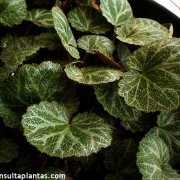Care of the indoor plant Saxifraga stolonifera or Strawberry begonia |
|
The genus Saxifraga, family Saxifragaceae, includes more than 400 species of herbaceous plants native to cold and alpine regions of the Northern Hemisphere. Some species are: Saxifraga stolonifera, Saxifraga x arendsii, Saxifraga umbrosa, Saxifraga rotundifolia, Saxifraga fortunei, Saxifraga retusa, Saxifraga granulata, Saxifraga cotyledon. Common names: Strawberry begonia, Aaron's beard, Mother of thousands, Roving sailor, Wandering Jew, Creeping saxifrage, Strawberry saxifrage, Creeping rockfoil, Strawberry geranium. This species is native to China, Japan, and Korea. They are small herbaceous plants with a creeping bearing that spread through stolons and reach 20 cm (7.87") in height. The attractive rounded leaves are green with large cream-colored veins. The flowers are small and white and appear in long inflorescences above the leaves. They bloom in summer. This easy-to-grow plant is used in pots as indoor plants, greenhouses, terraces and patios and to cover undergrowth and shady areas of the garden. Strawberry begonia is ideal for Mediterranean coastal gardens. Saxifraga stolonifera needs a semi-shade or shade exposure; it does not resist direct sun. It resists occasional frosts; the ideal annual average temperature is 18-25 ºC (64-77 ºF). Water frequently but with little amount of water. Aaron's beard prefers a medium-high humidity: spray the leaves from time to time with water without lime. The soil can be a commercial substrate for indoor plants or a normal garden soil. Prune off wilted flower stems. Saxifraga stolonifera is a plant resistant to the usual pests and diseases. Strawberry geranium is easily propagated by separation of the suckers that sprout from the stolons. |
Images of the indoor plant Saxifraga stolonifera or Strawberry begonia |
Find plants
Saxifraga stolonifera or Strawberry begonia | Care and Growing
© 2026 FavThemes



